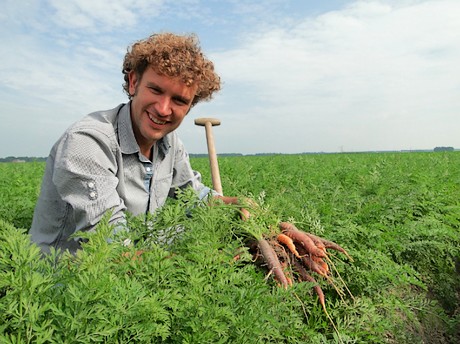
Nature & More has done a True Cost of Food calculation for the biodynamic producer, Krispijn van den Dries. The results show that the figures for organic food are better than for conventional products in the Netherlands as well. The multi-coloured carrots of Krispijn supply a social benefit of 1382 euro per hectare per year due to their impact on climate, water, and soil, in comparison to conventional carrots.
The difference between organic and conventional is especially large in terms of impact on the soil. The food production always has all kinds of hidden costs, such as costs for the purification of ground water. These ‘external costs’ are not paid by the chain and they will therefore not be expressed in the price of the product, to make sure that the consumer price will remain low. The bill will arrive at the government eventually and through that route, it ends up with the taxpayer, who thought that he was better off financially, for example, because of the water tax.
Thanks to the figures of the world food organization (FAO), the hidden costs can now be calculated, if one knows the footprints of the production. Nature&More, the international distributor of organic fruits and vegetables, has started to calculate these amounts for its producers and to make them public. After several imported fruits, now the traditional Dutch carrots of Krispijn van den Dries from Ens have been calculated properly.
The assessments have been performed by Soil & More International. The numbers show that the carrots of Krispijn, with respect to conventional carrots, have a social benefit of 125 euro for the climate, 108 euro for water, and 1149 euro for the soil, per hectare per year. The benefits for the biodiversity, health and social impact have not been used in these calculations. Per kilo, the differences are positive as well. Krispijn: “We are very careful with our soil. First, we have a very extensive crop rotation of 12 years and we use a lot of homemade compost. We only do minimal tillage, meaning that we do not plough, or only the surface, to a maximum of 10 to 15 centimeters. This keeps the creatures living in the soil alive. And we have a driving lane system to prevent compaction of the ground.”
The young organic producer adds: “I wanted the True Cost of Food to be calculated to show which costs we save society as organic farmers. It is important that an equal playing field is created for sustainable producers because that is not the case right now.”
For more information: www.natureandmore.com
Source: Fresh Plaza – Social Benefit of Organic Carrots at €1382/ha According to Nature and More











